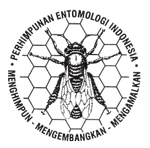Penyimpanan suhu rendah berbagai fase hidup parasitoid: pengaruhnya terhadap parasitisasi dan kebugaran Trichogrammatoidea armigera Nagaraja (Hymenoptera: Trichogrammatidae)
DOI:
https://doi.org/10.5994/jei.3.2.71Keywords:
Trichogrammatoidea armigera, egg parasitoid, temperature, fitness, ageAbstract
T. armigera is one of the potential egg parasitoids. The aim of this research was to study the effects of low temperatures ( 9ºC and 15ºC) on the fitness of T. armigera. The design of the experiments is a factorial design with two factors (temperature and age of parasitoid), with 10 replicates. Fitness were measured based on the survival, fertility, size, sex ratio, lifespan and fecundity. Result showed that the emergence of T. armigera was postponed by 2-5 days under low temperatures. Temperatures had a more significant effect than age of parasitoid. The postponement of adult emergence is very useful in regard to field application schedules. Percentage of adults emergence, sex ratio, egg productivity, fecundity tended to decrease under low temperatures, the length of female adult wings varied in each treatment and it tended to be shorter in 9ºC, while the width of female adult heads was almost similar in all treatment except in untreated control. These characters are very important in determining the fitness of the parasitoid in the field.Downloads
Downloads
Published
How to Cite
Issue
Section
License
Authors who publish with this journal agree to the following terms:
- Authors retain copyright and grant the journal right of first publication with the work simultaneously licensed under a Creative Commons Attribution 4.0 International License that allows others to share the work with an acknowledgement of the work's authorship and initial publication in this journal.
- Authors are able to enter into separate, additional contractual arrangements for the non-exclusive distribution of the journal's published version of the work (e.g., post it to an institutional repository or publish it in a book), with an acknowledgement of its initial publication in this journal.
- Authors are permitted and encouraged to post their work online (e.g., in institutional repositories or on their website) prior to and during the submission process, as it can lead to productive exchanges, as well as earlier and greater citation of published work (See The Effect of Open Access).








